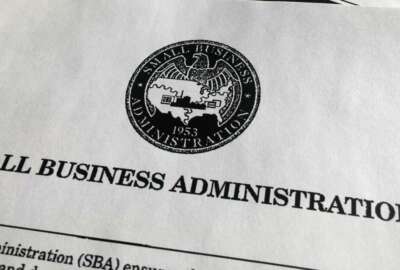
Would restoring Presidential Rank Awards help federal workforce?
For a few more ideas, Federal Drive with Tom Temin turned to American University Key Executive Leadership Program professor Bob Tobias.
Best listening experience is on Chrome, Firefox or Safari. Subscribe to Federal Drive’s daily audio interviews on Apple Podcasts or PodcastOne.
If you get what you reward, then restoration of the Presidential Rank Awards should be high on the list of the incoming Biden administration’s list of priorities for the workforce. For a few more ideas, Federal Drive with Tom Temin turned to American University Key Executive Leadership Program professor Bob Tobias.
Interview transcript:
Tom Temin: Bob, I guess you’ve got a lot of history watching incoming and outgoing administrations and have seen the vicissitudes of the workforce. But canceling the rank awards just seems like a tough deal. And the Obama administration did it for one or two years, and then the Trump administration has done it in its final year. Bad idea, huh?
Bob Tobias: And it’s really a symptom, Tom, it’s a symptom of the failure to recognize that the executive branch employees are a resource that need to be leveraged to achieve a president’s management agenda, a president goals and objectives for creating efficient and effective delivery of public service.
Tom Temin: And every year we have the Federal Employee Viewpoint Survey. And it actually doesn’t fluctuate that much according to who’s in the White House, even though it does fluctuate. But one of your ideas I really like here is that part of the president’s management agenda should have a measure of employee engagement as part of the goals of that management agenda.
Bob Tobias: Well, every president has had a management agenda since Clinton. And I expect that Biden will also have won, especially with the growing deficit is going to be pressed to use the human resources of the executive branch as efficiently and effectively as possible. So while it has been proven many times in the public and private sector, that an engaged workforce is more productive, and generates more public satisfaction. No prior administration has made employee engagement of publicly stated goal and significant administration follow up to implement that publicly stated goal. So I think the president ought take action to really validate the contribution of federal employees and call on them to improve their work processes and procedures to increase efficiency.
Tom Temin: Maybe one of the issues is that this comes up from time to time is that some of these really good government ideas aren’t great sales points in the political realm. And as long as people get their checks, or whatever the case might be, maybe they overlook the fact that the government itself gains legitimacy when services are high quality. And that often comes directly back to the federal workforce.
Bob Tobias: It does, I mean, to a member of the public, they view the efficiency and effectiveness of the executive branch in terms of what happens to them. Did they get their telephone call answered? Did they get their letter responded to? Did the person they speak to on the phone, speak with both knowledge and with affection? And if that doesn’t happen, then the public view is shaped by that.
Tom Temin: And the idea of the president having exposure directly to federal employees. I mean, they don’t really get seen much by the average federal employee, and the Senior Executives Association, maybe get a video message and so forth. I’ve often wondered why presidents don’t go into agencies more often, somehow, they could find an hour a week in that busy schedule to walk into NIH or walk into somewhere.
Bob Tobias: There are stories of past presidents actually visiting agencies and taking questions from federal employees, and showing an interest in what they do, how they do it, and their success. And I think and hope that President Biden will do that. And I also hope that he will call on federal employees through their unions to actually address problems that those employees know exists, and can be solved if they were listened to.
Tom Temin: Why does it need to be through the unions then?
Bob Tobias: Well, because about 80% of federal employees are represented by unions. And when an employer’s wants to increase productivity, they have to deal with employees through their unions. I mean, that’s just what the law is. And there’s a lot of success, recorded success when agencies do that when they actually engage employees through the unions. There is success, there is measurable success.
Tom Temin: And a related issue is the management union or management employee councils. Again, these are come and go. They come with Democrats, they go with Republicans, so presumably they would come back under the Biden administration, but it would seem like the lack of continuity there between the shifting parties might be part of the problem also.
Bob Tobias: It is because those councils that you refer to require building trust in order to be effective. If they come and go with a change in administration, there’s a reluctance on either party to invest in the trust that’s necessary to make them work.
Tom Temin: And let’s talk about the Senior Executives Association a little bit more, they did not get the rank awards this year. And that’s a tough one. Because yes, there’s a what looks like a relatively large bonus that goes with it. But in the grand scheme of things, it’s not that much money for the federal government. And that would seem like just such an important avenue. And where the rubber hits the road is the politicals walking into the agencies and encountering the SES.
Bob Tobias: That’s true. Every single person needs to be validated in their work. The rank awards are an incredibly public validation of the work of members of the Senior Executive Service. When that’s eliminated, it’s like, what’s the matter, you didn’t notice me, you don’t recognize me? Why should I work so hard next year, when you don’t notice what I’ve done last year. And I think that’s true across the board. When managers at any level don’t have the skill or the knowledge to really engage with those they lead or validate the work of those they the we don’t get the full energy of that person, as an employee of the executive branch.
Tom Temin: And couldn’t the president any president amplify that idea or that tendency to want to value federal employees in not so much what the president does necessarily alone, but you’ve got deputy secretaries, you’ve got under secretaries for management and these types of positions that actually carry out the policy, in addition to the secretaries themselves, but it’s often the deputy secretary or the undersecretary that’s dealing directly with the workforce on a day to day basis. That seems like the leverage point to try to really get the most out of the federal workforce.
Bob Tobias: It is, I couldn’t agree more Tom. But I think that every single political appointee is stretched, they don’t have time. And so they’re constantly prioritizing what they should do and when they should do it. Now, if the president is setting the tone of validation, encouragement and engagement, and calls upon those deputies to do the same thing, they’ll do it, they’ll model the behavior of the president. But if the president isn’t doing it, and only talking about it, they won’t do it.
Tom Temin: So which president can you think of in the last five or six of them that actually was good on the engagement front?
Bob Tobias: President Clinton was the best because he not only encouraged the labor management partnership, but followed up and supported it personally. And Vice President Gore was actively involved. But what he didn’t do was require, his executive orders required real measurement of success, but he didn’t follow up and actually enforce that. So there are a lot of people who report success and measured success individually. But collectively, it didn’t happen. And President Obama talked about it, but didn’t really follow up and didn’t model the behavior of encouraging and validating federal employees.
Tom Temin: Alright. So how would you rate the outgoing Trump administration on that scale?
Bob Tobias: They were the lowest. They denigrated federal employees in the work of federal employees. And I think it’s a credit to the workforce that notwithstanding that they continue to work and they continue to produce. And what would it be like if they had a leader who validated the work that they already do?
Tom Temin: Bob Tobias is a professor in the key Executive Leadership Program at American University. We’ll have to see what happens. Talk to you next time.
Bob Tobias: Thanks, Tom.
Copyright © 2025 Federal News Network. All rights reserved. This website is not intended for users located within the European Economic Area.
Tom Temin is host of the Federal Drive and has been providing insight on federal technology and management issues for more than 30 years.
Follow @tteminWFED
Related Stories





